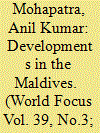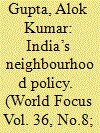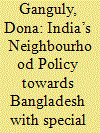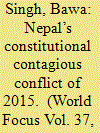| Srl | Item |
| 1 |
ID:
156578


|
|
|
|
|
| Summary/Abstract |
India in the 21st century is striving for global outreach and it cannot truly become a global player if it cannot move beyond the security and political issues of the Indian subcontinent. According to Kaplan (2013, p. 254) ‘India is a regional power to the degree that it is entrapped by this geography (of the Indian subcontinent); it is a potential great power to the degree that it can come beyond it’.
|
|
|
|
|
|
|
|
|
|
|
|
|
|
|
|
| 2 |
ID:
158116


|
|
|
|
|
| Summary/Abstract |
One of the signs of the South Asian “Spring” of 2008 eroding into a “Winter” is the recent developments in the island nation of the Maldives. Nepal’s long struggle to draft an effective Constitution with a stable government since 2008, Pakistan’s democratic leadership continuing to speak the language of the military establishment on several acts of terror, the struggle of the Awami League-led Government to fight the challenges emanating from the alliance of the radical forces who have threatened even to boycott the 2018 polls in Bangladesh, and, the silence and dissent-free democracy in Bhutan etc. are the other signs.
|
|
|
|
|
|
|
|
|
|
|
|
|
|
|
|
| 3 |
ID:
167262


|
|
|
|
|
| Summary/Abstract |
Amidst NDA government’s many foreign policy achievements, its south Asian policy remains mired in setbacks and uncertainties. Lack of trust and Chinese inroads are the most important factors to explain it. While India has been following a policy to strengthen trust, cooperation and mutual benefit with her neighbours, China has steadily increased her influence in many countries including Sri Lanka, Maldives, Bangladesh, Myanmar and Nepal.
|
|
|
|
|
|
|
|
|
|
|
|
|
|
|
|
| 4 |
ID:
146731


|
|
|
|
|
| Summary/Abstract |
An integrated South Asia shall always be in the larger interest of India. It shall turn out to be an economic giant and attractive for the external powers of the regional as well as the world. However, delineating a more integrated South Asia is no mean task. In the South Asian context, the centrifuge operated by India-Pakistan relations draws the region apart. India at this juncture need to rethink about implanting the ‘Idea of India’ in the heart and mind of leadership as well as people of the region. Undoubtedly, challenges are there before Mr. Modi to reinforce the ‘Idea of India’ by aligning the goals of ensuring that we are the largest democracy of the world and also a global power to be recon with. Such an endeavour will not be successful if Indian leadership fails to be magnanimous in their thought and actions.
|
|
|
|
|
|
|
|
|
|
|
|
|
|
|
|
| 5 |
ID:
158122


|
|
|
|
|
| Summary/Abstract |
The art of conducting the foreign affairs of a country lies in securing the national interest of the country or if put in simple words it is the method of investigating what is most advantageous to the country in the long run. However when the country has to formulate its policies towards its immediate neighbours, it is often seen that the concern for the border security is prioritized over all other considerations.
|
|
|
|
|
|
|
|
|
|
|
|
|
|
|
|
| 6 |
ID:
146745


|
|
|
|
|
| Summary/Abstract |
Nepal has been undergoing a swift and unparalleled transformation in the political arena on account of factors like absence of unity among political parties, inadequate political participation for minority and ethnic people, economic weakness and vested interests of regional and external powers in the country's stability. Since 1950, Nepal has seen six constitutions and last one was promulgated on September 20, 2015 after the seven years grueling efforts of Constituent Assembly-1 and Constituent Assembly-II (2008-2015). The scholars, analysts, politicians of Nepal have been considering it as a very progressive and inclusive document. However, it has proved more contentious and controversial as the one-third Nepalese population (Madheshi people), who perceived it as discriminatory and exclusive one. It has created political paralysis in Nepal creating a lot of contagion effects of cold and cough for India as well.
|
|
|
|
|
|
|
|
|
|
|
|
|
|
|
|